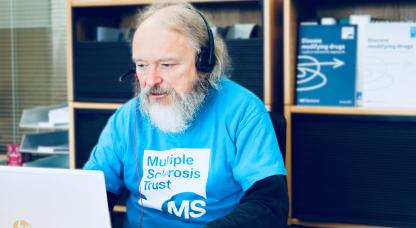Breathing problems can be common in MS, especially in people with advanced MS. If you have significant disability, are restricted to seated or lying postures, or have other complex medical needs, you may find that managing your breathing becomes an important part of your care, both at home and with the help of your medical team. You might find breathing problems referred to as respiratory dysfunction or respiratory complications.
Breathing problems are not exclusively found in advanced or progressive MS, and can begin early in the course of MS, or arise as a result of infection. If you have any sudden onset of breathing difficulties or shortness of breath, you should see a doctor urgently or visit the Accident and Emergency ward of your nearest hospital (A&E).
What causes breathing problems in MS?
Everyone's MS is different, and breathing problems can have a variety of causes. The most common cause of breathing problems in MS is the loss of muscle strength in the chest and abdomen. Muscle weakness is a common MS symptom, and the muscles you use to breath are just as prone to weakness as those in your arms or legs. If your chest muscles are weak, then inhaling and exhaling takes more effort and is more tiring.
This muscle weakness can come about directly from MS damage to the nerves controlling the muscles you use to inhale and exhale, but the weakness can also be caused or made worse by reduced mobility. If you have trouble remaining upright, or little opportunity to move your upper limbs, then your torso muscles will not be exercised effectively and they will lose strength.
Very occasionally, MS might damage the part of the brain responsible for control of breathing. Other people with MS might find that the nerves that control the mouth and throat are affected, or that they have sensory issues around the mouth that affect their breathing. On top of that, some of the medications prescribed for MS symptoms can affect breathing, particularly tranquilisers or muscle relaxants.
Any of these factors can result in you taking shallower, more frequent breaths, having a reduced lung capacity, and a sense in which you can't take a really satisfying big breath. People with breathing problems in MS may also notice that their cough strength is reduced, their voice is weaker or quieter, and they find it harder to speak for long periods.
Why do breathing problems matter in MS?
If you have breathing problems, you may find that other aspects of your health and well-being are affected. The knock-on effects of breathing problems include:
- poor sleep, leading to excessive sleepiness in the day
- lower oxygen levels in the blood and brain, leading to poor thinking and memory
- reduced cough strength, leading to increased risk of chest infections if food particles and secretions cannot be cleared
- breathing takes more effort, leading to increased fatigue
- weaker voice, leading to social isolation.
Treating breathing problems might therefore improve a number of other issues which might otherwise have been put down purely as MS symptoms, such as fatigue, depression, increased risk of infection or cognitive problems.
How can breathing problems be treated?
If you have breathing problems, you can ask to be referred to a Respiratory Service or Respiratory Care Team where the specialist nurses and therapists will be able to assess your needs. They may ask for blood tests or an oximeter test to see if your blood oxygen levels are low. An oximeter test is non-invasive, and uses a soft clip on the finger tip or earlobe, with a light that shines into the skin.
The respiratory team will take into account your mobility level and any other co-morbidities you have and suggest some options for treatment or self-management. This list is not exhaustive, but some common options include:
- drugs delivered via an inhaler or nebuliser that you can use at home
- oxygen therapy either at home or in a clinic setting
- a pulmonary rehabilitation course, to build the strength and efficiency of your chest muscles, prevent deconditioning and encourage lung-safe exercise
- a cough assist machine, which can help clear lung secretions and build your lung capacity
- a CPAP device (continuous positive airway pressure) which can assist your breathing at night and improve your sleep quality, fatigue and cognition.
Other health professionals that may be involved in helping you to manage breathing problems include speech and language therapists, physiotherapists and rehabilition specialists.
How can I manage breathing problems myself?
You may not have severe breathing problems where a referral to a Respiratory Team is necessary, or you may wish to prevent breathing problems from developing. Here are two ways in which you can manage your breathing in MS yourself.
Exercise your respiratory muscles
Regular exercise of the arms and upper body can help to strengthen the chest muscles. They can be just as prone to MS weakness as any other muscles in your body, but it's easy to forget them in your exercise regime. They are the muscles that power your breathing, and if they are weak then you will find it harder and more tiring to inhale and exhale.
Have a look at our gentle exercise programmes, try out our Move it for MS exercise DVD, or seek advice from a sports coach or physiotherapist. Do what you can manage, and remember that even gentle activity can help prevent deconditioning of the muscles.
Minimise your risk of getting a chest infection
Chest infections can be both a cause and a result of breathing problems, and a chest infection can have serious impact on your quality of life. Aspirational pneumonia can occur if food particles are inhaled into the lungs. Take care to chew your food carefully, try not to talk while eating, and seek help with your position while eating and drinking, if necessary.
Practice general infection control, such as washing your hands regularly and taking up your influenza vaccination when offered. Be alert for early signs of sickness or a cough and tell your GP straight away. You may wish to remind them that you could have reduced lung function due to MS.
-
Rietberg, MB et al.
Respiratory muscle training for multiple sclerosis
Cochrane Database Syst Rev. 2017 Dec 21;12
Summary (link is external)
Hensen, HA et al.
Sleep-Disordered Breathing in People with Multiple Sclerosis: Prevalence, Pathophysiological Mechanisms, and Disease Consequences
Front Neurol. 2017; 8: 740. Published online 2018 Jan 15
Full article (link is external)


